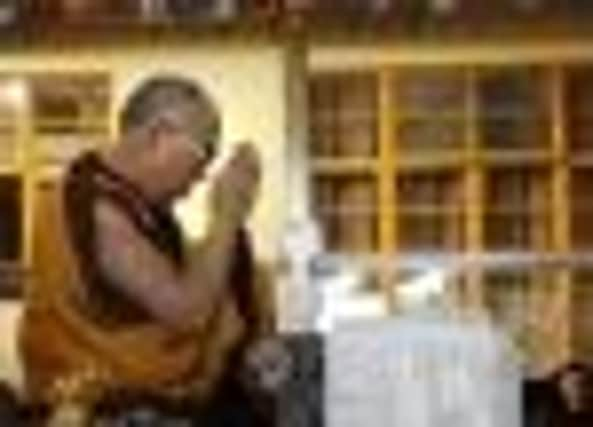Dalai Lama accused of inciting terrorism with prayer service


The 90-minute-long service at the Dalai Lama’s Tsuglakhang Temple, in the northern Indian town where he lives in exile, focused on the monks, former monks and a nun who have self-immolated since March in a Tibetan area of western China that has been under martial law.
Aged in their late teens and twenties, at least five died of their injuries, while the condition of the other four is unknown.
Advertisement
Hide AdAdvertisement
Hide AdAt the service, the Dalai Lama led rhythmic prayers for the dead and suffering as Tibetans tended butter lamps. The newly elected prime minister of the Tibetan government-in-exile, Lobsang Sangay, urged China to change its stance.
He said: “We would like to appeal to the Chinese government to immediately stop its repressive policies in Tibet, and to resolve the issue of Tibet through peaceful means.”
The prayers in Dharmsala were one of several services held in honour of the Tibetans. Taiwan also held prayers and in New Delhi, Tibetans held a protest after a service.
The commemorations underscored how the immolations served to draw attention to the situation in Aba, a Tibetan community which has been a flashpoint for Tibetan unrest.
In 2008, Chinese troops fired on protesting Tibetans. Since then the area has resembled an armed encampment with riot squads, checkpoints and purges of monasteries.
In Beijing, the Chinese foreign ministry condemned the immolations and directed special criticism at the Dalai Lama and the prayer services, saying that such support would be an incitement akin to terrorism.
Ministry spokeswoman Jiang Yu said: “In the wake of the incidents, overseas Tibet independence forces and the Dalai Lama group did not criticise the cases but on the contrary glorified such cases and incited more people to follow suit. As we know, such splittist activity at the cost of human life is violence and terrorism in disguise.”
The Chinese government has repeatedly accused the Dalai Lama of encouraging separatism but rarely acknowledges its policies may contribute to unrest.
Advertisement
Hide AdAdvertisement
Hide AdMichael Davis, a law professor at Hong Kong University who writes about Tibet, said: “Anything they don’t like in Tibet is somehow stirred up by the Dalai Lama … they seem to not want to take any responsibility for what appear to be spontaneous expressions of deep concern by these young people.”
Human Rights Watch has said that tightened security has led to a six-fold increase in spending on police, prisons and other parts of the public security apparatus in Aba since 2002.
In attempts to rein in a Buddhist clergy seen as supportive of Tibetan independence, Beijing has put limits on the numbers of monks and nuns and forced clerics to denounce the Dalai Lama. The attack on religion, a central feature of Tibetan life, makes Tibetans more uneasy at a time that members of the Han Chinese majority are migrating to the region in greater numbers.
Also attending yesterday’s prayer services was Kirti Rinpoche, the exiled head of the Kirti monastery, which has been at the centre of troubles in Aba.
He has recently given implied approval of the immolations, saying that sacrificing one’s life to defend one’s Buddhist beliefs is not considered violent.
“Never relax your vigilance in upholding the truth of the Buddha’s excellent teaching for a single moment, even at the cost of your own life,” he said.